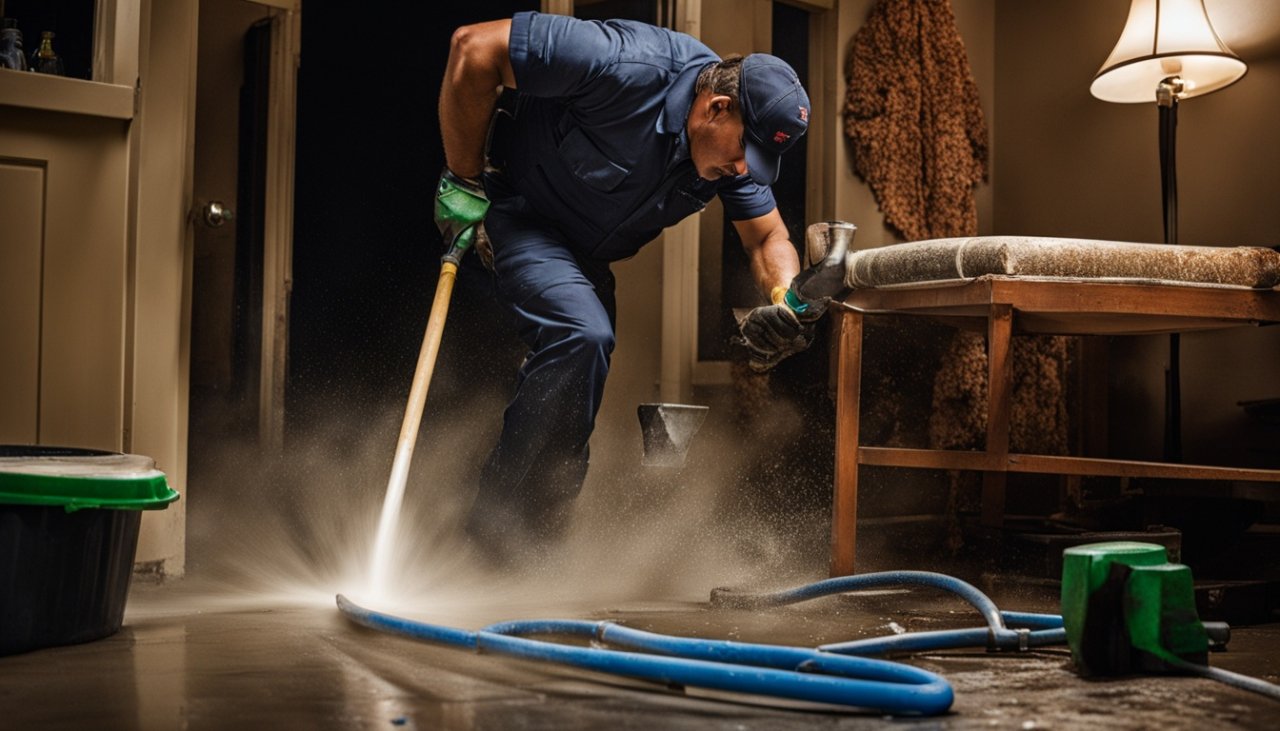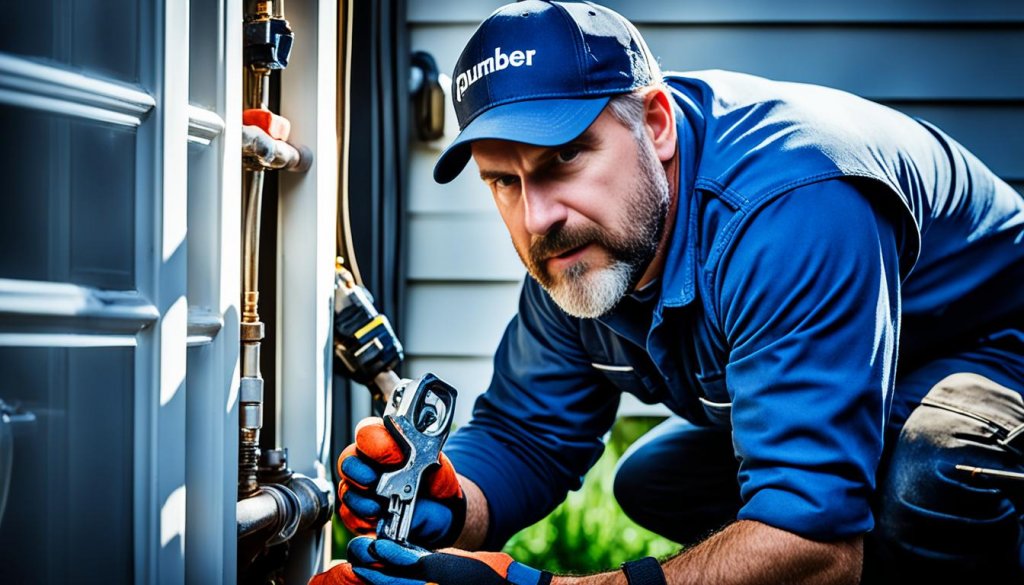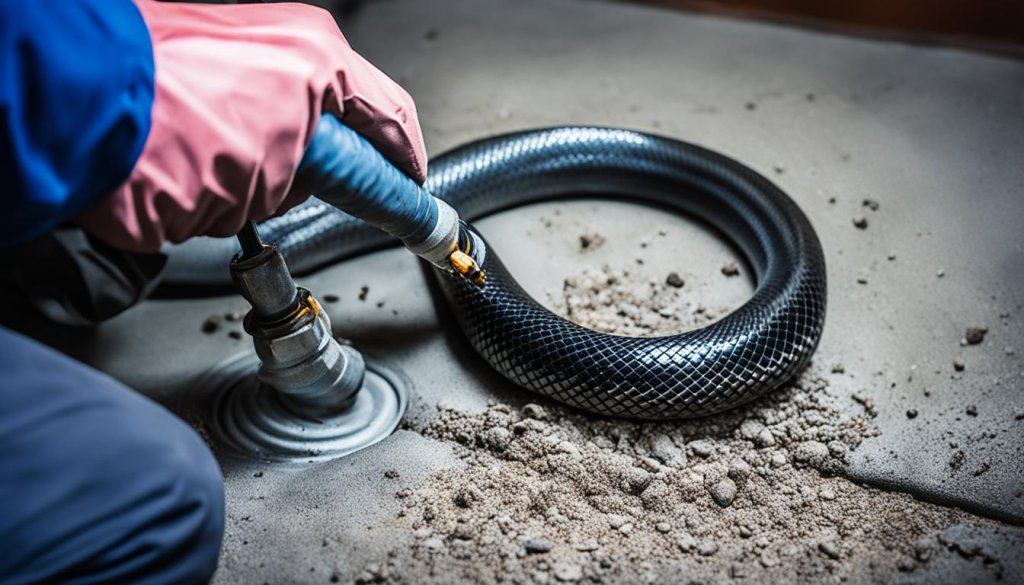Ever wondered how to act fast when a plumbing crisis hits? Emergency plumbing problems can happen without warning, leaving you facing issues like burst pipes or sudden leaks. As a homeowner, I’ve found that acting quickly can mean the difference between a small problem and a big disaster. This guide aims to share tips I’ve learned for dealing with these urgent plumbing issues efficiently. By understanding how to spot and fix problems, you can lessen stress and protect your home from major damage. Let’s look at how to handle plumbing emergencies with confidence.

Key Takeaways
- Burst pipes can cause significant water damage if not addressed immediately.
- Clogged drains often lead to serious plumbing issues such as overflows and leaks.
- Knowing how to shut off your water supply is crucial in emergencies.
- Regular maintenance can help spot issues before they become emergencies.
- Creating an emergency plumbing kit can assist in handling quick repairs.
- Investing in safety devices like water leak detectors can save you from costly damages.
Understanding Emergency Plumbing Situations
Knowing how to handle emergency plumbing situations is key to quick action. Some emergencies are more common and need fast action to avoid big damage. It’s vital to understand these situations and know when to call a local emergency plumber.
Common Types of Plumbing Emergencies
Burst pipes are a common issue, often caused by sudden temperature changes or high water pressure. A burst pipe can spill 200 gallons of water a day, causing a lot of damage. Leaks waste a lot of water, with the EPA saying up to 10% of homes lose 90 gallons daily.
Clogged drains can turn into overflows, causing more damage. Ignoring clogs can mean pipes need to be fully replaced. So, it’s important to fix these issues quickly.
The Importance of Quick Response
Acting fast in plumbing emergencies is crucial. Quick action can reduce damage and save on repairs later. If I see a leak, calling a 24/7 plumber right away can prevent mold and structural damage.
Understanding the urgency helps me use services like emergency plumbing services better. For homeowners in Pelham, AL, knowing that companies like Douglas Cooling & Heating offer 24/7 help can be reassuring during emergencies.
Identifying the Problem
Finding the source of a plumbing emergency is key to fixing it fast. At the start, I use important assessment techniques. This helps me figure out if I can fix it myself or if I need professional help to prevent more damage.
Initial Assessment Techniques
First, I look for signs like water on the floor or walls that feel damp. A high water bill could mean there’s a leak somewhere. If I smell gas, I get out of there fast and call for emergency plumbing help. Gas leaks are dangerous and can cause explosions or fires.
Common Issues: Leaks, Burst Pipes, and Clogs
Gas leaks, clogged drains, burst pipes, and overflowing toilets are common plumbing problems. A clogged sink can really mess up my day and cause more trouble. Small leaks might be fixed with plumber’s tape, but big leaks or sewer backups need quick, expert help.
Knowing about these issues helps me decide when to call a pro. This way, I can get things fixed fast and safely.
Shutting Off the Water Supply
Dealing with a plumbing emergency can be scary, but knowing how to turn off the water can really help. This step is key to stop more water damage and make fixing the issue easier. The first thing I do is find the main water valve. It’s usually near the water meter or where the water line comes into the house.

Locating the Main Water Valve
Knowing where the main water valve is is crucial for homeowners. These valves are often outside, near the curb, in a box marked “WATER.” Knowing this spot ahead of time helps me and my family in emergencies. If we need to call an emergency plumbing company, finding and turning off the water fast can save time and money.
Types of Valves and Their Operation
Learning about different valves helps in handling plumbing problems. There are mainly two types: gate and ball valves. Gate valves need a few turns to fully close, while ball valves only need a quarter-turn. Knowing how to use both types makes me and my family ready for emergencies.
Temporary Containment Measures
When a plumbing emergency hits, quick action is key. Acting fast can really help reduce damage until experts get there. I often use items from my home for emergency repairs. This keeps things stable until a professional plumber can fix the issue.
Using Household Items for Emergency Repairs
Common household items can be lifesavers in emergencies. For example, placing buckets under leaks can stop water from damaging floors and walls. Towels are great for soaking up extra moisture, which helps prevent mold from growing.
I always have plumber’s tape ready for small leaks. It’s a quick fix until a professional can provide a lasting solution.
Tips to Control Minor Leaks
Here are some tips for handling minor leaks. If I spot a slow leak under the sink, I use sealant or pipe clamps from my emergency kit right away. These steps save me money on repairs and prevent more damage.
When a leak happens, I act quickly. I turn off the main water supply to stop flooding. Knowing these steps helps me keep my home safe until help arrives.
Emergency Plumbing Services: When to Call a Professional
Knowing when to call a reliable emergency plumber can save a lot of time and prevent big damage to my home. Not every plumbing problem can be fixed with DIY solutions. For example, if I have clogs or big leaks, especially sewer line ones, I should call for help.
Getting a licensed emergency plumbing service gives me peace of mind. They come quickly and know how to fix big plumbing issues. Things like burst pipes or leaks that waste a lot of water can get worse fast.
Signs like a sulfur smell or hissing sounds could mean a gas leak, which is dangerous. It’s important to take these signs seriously and get help right away. Knowing when to call a pro can keep me safe, save time, and money on repairs.
It’s smart to keep the number of a trusted local emergency plumber handy. Fast action by experts can stop mold, mildew, and save me from expensive repairs and health risks.
Managing Clogs and Blockages
When I face clogs and blockages, acting fast is key to prevent things from getting worse. Simple solutions often work for minor issues. For example, a plunger can clear most soft blockages. A mix of baking soda and vinegar is also great for unclogging sinks and showers without harming the environment. Regularly flushing drains with hot water helps dissolve fats and oils.
DIY Techniques for Simple Clogs
For a basic clog, I start by checking and cleaning the drain stopper. If that doesn’t work, boiling water can clear the line by removing debris. Enzymatic cleaners are also useful for breaking down organic stuff. Keeping sink, shower, and tub drains clean is crucial, especially in areas with lots of hair and soap scum. I tell others to only flush human waste and toilet paper to avoid clogs.
When to Seek Professional Help
Blockages that keep coming back or affect many fixtures mean it’s time to call a reliable emergency plumber. Some clogs, like those from grease or food in the kitchen sink, need more than DIY fixes. If drains are slow or smell bad, it’s a sign I should get professional help. Quick action from skilled plumbers can prevent bigger plumbing problems and save me money on repairs.

Handling Burst Pipes
When a burst pipe happens, acting fast is key to reduce damage. First, I turn off the main water supply. This step can prevent costly repairs and cleanups. Next, I open all faucets to drain any leftover water.
While waiting for experts, I use temporary fixes like pipe clamps or plumbing epoxies. These can hold things together for a bit but aren’t as strong as a professional fix.
Immediate Actions to Take
Quick action after a burst pipe can really help prevent more damage. It’s smart to take photos of the damage for insurance claims. Starting to dry the area quickly also helps stop mold from growing.
If the flood is big, I know I need professional help for water damage restoration. For emergencies, I call Benjamin Franklin Plumbing® of Baltimore. They offer 24/7 services with plumbers who are checked and tested, giving me peace of mind.
Temporary Patching Methods
While waiting for a plumber, using temporary fixes can help. Pipe clamps or plumbing epoxies can keep things stable until repairs can be done. Knowing help is on the way lets me manage the mess.
It’s crucial to get a skilled plumber quickly for a lasting fix and to avoid more emergencies.
Preparing an Emergency Plumbing Kit
Being ready for plumbing emergencies can really help. A well-stocked emergency plumbing kit with the right tools lets me fix problems fast before experts get there. Keeping the kit tidy and easy to find helps reduce stress and keeps me calm when things go wrong.
Essential Tools and Supplies
There are key items every emergency plumbing kit should have. A five-gallon bucket is great for storing tools and catching water from leaks. Plumber’s putty is important for making tight seals on faucets, drains, and pipes.
Washers or replacement cartridges can fix dripping faucets and save water. Plungers come in different types for various tasks, like sinks or toilets. Duct tape can temporarily fix small leaks until a lasting solution is found.
A toolbox with a pipe wrench, adjustable wrench, slip-joint pliers, and screwdrivers is also crucial for repairs.
Educating Household Members on Kit Usage
It’s important to know what to do in emergencies. I teach everyone where the emergency plumbing kit is and how to use it. A flashlight is useful for looking in dark places under sinks or appliances during repairs.
Wearing disposable nitrile gloves protects against germs and keeps things clean. Teaching everyone about the kit’s tools helps them handle small problems and lowers stress in emergencies. Knowing where the main water shut-off valve is also key for quick action.
Conclusion
Handling emergency plumbing situations well needs being ready and knowing what to do. Having the right tools and understanding common plumbing problems like burst pipes and clogged sewer lines is key. Knowing when to act and when to call a trusted emergency plumber is crucial to protect my home.
This guide helps me tackle plumbing emergencies with confidence. Taking quick steps, like turning off the water and calling emergency plumbing, can really help. It limits damage and gets my plumbing back to normal. Quick action is vital; it protects my property and keeps my family safe from water contamination risks.
Being proactive with regular maintenance and teaching my family about plumbing helps me manage emergencies better. This way, I can keep my home and family safe and make plumbing problems less stressful when they happen.
See how FieldAx can transform your Field Operations.
Try it today! Book Demo
You are one click away from your customized FieldAx Demo!
FAQ
What should I do first in a plumbing emergency?
First, turn off the water supply at the main valve to stop more damage. Learn where and what type of valve it is in your home. This makes it easier to find it when you need to act fast.
How can I identify a plumbing emergency?
Look out for signs like burst pipes, big leaks, clogged toilets, and water heater problems. If you see these, act quickly to lessen the damage.
When should I call an emergency plumbing service?
Call a trusted emergency plumber for severe leaks, burst pipes, or clogs that don’t go away with DIY fixes. They can fix things safely and efficiently.
What are some temporary fixes I can apply before help arrives?
For small leaks, use plumber’s tape or sealant as a quick fix. Put buckets under leaks or use towels to soak up water until help gets there.
How do I manage toilet clogs effectively?
Try using a plunger or a mix of baking soda and vinegar for simple clogs. If it doesn’t work or affects more than one toilet, get help from an emergency plumbing service.
What kits should I prepare for plumbing emergencies?
Keep an emergency plumbing kit with tools like wrenches, plumber’s tape, sealants, and towels. Make sure everyone knows where it is and what’s inside for fast action in emergencies.
How do I handle burst pipes?
If you see a burst pipe, turn off the main water supply and open faucets to drain the water. Use pipe clamps as a temporary fix, but call a 24/7 plumber for a lasting solution.
What should I know about my home’s valves?
Know where the main water shut-off is and the valve type—gate or ball valve. Gate valves need more turns to shut off, while ball valves are quicker.
Author Bio
Co-Founder & CMO at Merfantz Technologies Pvt Ltd | Marketing Manager for FieldAx Field Service Software | Salesforce All-Star Ranger and Community Contributor | Salesforce Content Creation for Knowledge Sharing






